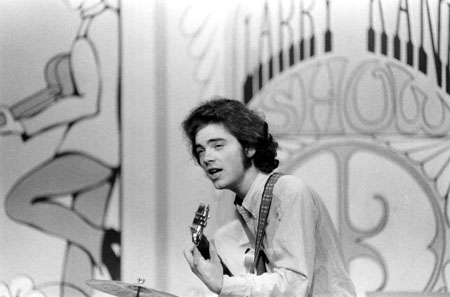FILM-FORWARD.COMReviews of Recent Independent, Foreign, & Documentary Films in Theaters and DVD/Home Video
Directed by: Keven McAlester. Produced by: Adrienne Gruben & Keven McAlester. Photographed by: Lee Daniel. Edited by: Victor Livingston. Music by: Roky Erickson. Released by: Palm Pictures., Country of Origin: USA. 94 min. Not Rated. With: Roky Erickson and the 13th Floor Elevators, Billy Gibbons, Patti Smith, Thurston Moore & Gibby Haynes. DVD Features: Deleted Scenes. Additional footage. Archival material. Roky Erickson: Performances and Spoken Word. Evelyn Erickson: Collected Videos. Postscript: Roky Today, including a performance at Austin City Limits Festival 2005. For rock fans, You’re Gonna Miss Me answers the question, “Whatever happened to Roky Erickson,” in a film startlingly similar to Jeff Feuerzeig’s documentary The Devil and Daniel Johnston. Both trace the impact of mental illness on a musician and his Southern family – but a very different family here as the film opens with legal wrangling. While Daniel Johnston is a curious sidebar to the Austin music scene, Roger “Roky” Erickson was a seminal figure in the Texas-to-San Francisco counterculture axis of the 1960’s, inspiring the raw style of Janis Joplin. As a founding writer, guitarist, and singer for the 13th Floor Elevators, he helped take the San Francisco Sound from the folk-based experimentation of the Byrds and the Grateful Dead to the harder rhythms of psychedelic rock. But as friends and band mates detail the degree and depths of Erickson’s drug addiction, from LSD to heroin and speed, it’s surprising that director Keven McAlester even found so many survivors to be coherently interviewed. Deteriorating from drug abuse, Erickson’s came back home to Texas, where he was diagnosed with schizophrenia. In a unique set of interviews, retired Austin police officers are still proud that they made him a get-tough-on-drugs example, arresting Erickson for possessing one marijuana joint. As a result, his lawyer made a tactical decision to have him adjudicated insane (shades of One Flew Over the Cuckoo’s Nest). But his habitual escapes from a minimum security facility, with help from friends, led to an escalation of his punishment. Like Johnston, he disappears from public sight into a now closed state mental hospital, mistreated with shock therapy. After his release 1972, he channels his experiences and now exacerbated inner demons for a brief comeback with what he calls “horror rock,” as Roky Erickson and the Aliens. The chronology of his audio and televised interviews, and those of ex-wives and girlfriends from the 1970’s into the 1980’s, gets a bit confusing. However, the footage of his poetry reading and performing reveal his moments of lucidity could be overpowered by paranoia, similar to the devil obsessions that haunted Johnston after his hospitalizations. And then the film dramatically and narrowly focuses on how an intervention reclaimed a life out of family dysfunction. A lot of footage is spent, a bit unfairly, on the pitiful, defensive ramblings of his mother, Evelyn, who also seems to have psychological problems. Her early musical career, stymied by raising five sons with an evidently abusive, alcoholic husband (seen briefly now deep into dementia), is portrayed in a jumble, along with her fanciful filmmaking (her complete videos are an extra on the DVD), including her avant-garde looking “Roky – King of the Beasts.” But the camera sadly shows how her supervision of his “independent living” infantilizes him into a filthy daze of fascination with junk mail and children’s toys. Late in the film, her second oldest son is also glimpsed suffering from severe depression aggravated by self-medication with alcohol. However, his youngest brother, Sumner, left the increasingly dysfunctional home at 18 and has straightened himself out in Pittsburgh, becoming a professional musician. Through unconventional holistic massage therapy, he somehow gets the calling and fortitude to go home and rescue his oldest brother in front of the camera. In a “One Year Later” epilogue, Sumner is relieved and proud that his brother “is back in the world,” even as he himself barely holds it together financially and psychologically under the strain of being Roky’s caregiver. The DVD includes a subsequent follow-up to 2007. (Roky recently performed in New York City with a young, energetic backing band to an enthusiastic audience.) The accompanying soundtrack album includes rare and acoustic performances along with his classics.
Just as the Whitney Museum of American Art uses the title song to accompany its exhibition “Summer of Love: Art in the Psychedelic Era,” this film should be part of that year’s anniversary commemorations.
Nora Lee Mandel
|
